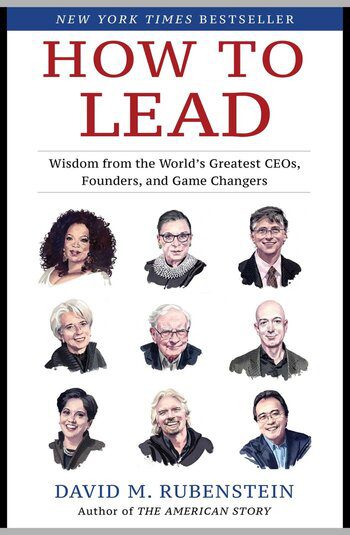In How to Lead: Wisdom from the World’s Greatest CEOs, Founders, and Game Changers, American lawyer and co-founder of the private equity firm The Carlyle Group, David Rubenstein interviews and profiles some of the world’s most successful individuals. He shares his discussions, advice, and wisdom from CEOs, presidents, founders, and master performers from the worlds of finance (Warren Buffett, Jamie Dimon, Christine Lagarde, Ken Griffin), tech (Jeff Bezos, Bill Gates, Eric Schmidt, Tim Cook), entertainment (Oprah Winfrey, Lorne Michaels, Renee Fleming, Yo-Yo Ma), sports (Jack Nicklaus, Adam Silver, Coach K, Phil Knight), government (President Bill Clinton, President George W. Bush, Ruth Bader Ginsburg, Nancy Pelosi), and many others.
David Rubenstein has had a long fascination with different individuals becoming and staying leaders. In 2008, he became the president of the Economic Club of Washington, D.C., and began almost monthly interviewing a prominent business, government, or cultural leader. As a follow up he started the Peer to Peer interview show on Bloomberg TV in 2016 (broadcast on PBS as well since 2018). The How to Lead Book is an outgrowth of these interviews and is designed to provide the reader with the perspectives of different kinds of leaders, with the hope that readers might be inspired to develop or enhance their own leadership skills.
Rubenstein divides the leadership experience of interviewees in the book into six categories:
- Visionaries: Jeff Bezos, Bill Gates, Richard Branson, Oprah Winfrey, and Warren Buffett
- Builders: Phil Knight, Ken Griffin, Robert F. Smith, Jamie Dimon, and Marillyn Hewson
- Transformers: Melinda Gates, Eric Schmidt, Tim Cook, Ginni Rometty, and Indra Nooyi
- Commanders: George W. Bush and Bill Clinton, Colin Powell, David Petraeus, Condoleezza Rice, and James A. Baker III
- Decision-Makers: Nancy Pelosi, Adam Silver, Christine Lagarde, Anthony S. Fauci, and Ruth Bader Ginsburg
- Masters: Jack Nicklaus, Mike “Coach K” Krzyzewski, Renée Fleming, Yo-Yo Ma, and Lorne Michaels
Leadership comes in many forms and is exercised in many ways. Some leaders can command military troops in war. Others can conceive of and build large companies. Some leaders can develop scientific breakthroughs that improve the lives of millions of people, or use their expertise to help guide the public response to dangerous new diseases. Others can create works in the visual or performing arts that trigger deep emotions and showcase human expression at its highest level. Some can master athletic skills that unite fans around the world, while other leaders can transform an existing organization or develop solutions to complicated problems. Still others are able to create new ways of communicating or thinking.
Why should anyone really want to be a leader?
First, a leader can create the type of change or results that will improve the lives of others. Second, a leader can motivate others to become leaders, and in turn improve others’ lives. And third, a leader can feel a sense of accomplishment and achievement that provides human fulfillment and happiness.
Characteristics of Leaders
The Ability to Keep Learning.
Leaders need to expand their knowledge every day—to exercise their most unique muscle: their brain. Failing to do so makes it difficult to keep up with a rapidly changing world and with the increasingly large amounts of information that can be helpful in being an informed, knowledgeable leader.
I have tried to continue to learn by somewhat obsessive reading: six newspapers a day, at least a dozen weekly periodicals, and at least one book a week (though often trying to juggle three to four books simultaneously). Nothing focuses the mind like a well-written book.
Integrity.
Leaders vary in their commitment to integrity and ethical behavior, but the most effective leaders are seen as committed to highly ethical behavior—and that commitment enhances their leadership capabilities.
Jeff Bezos – The Value of resting and Decision Making
DR: You like to get eight hours of sleep.
JB: I go to bed early. I get up early. I like to putter in the morning. I like to read the newspaper. I like to have coffee. I like to have breakfast with my kids before they go to school. So I have my puttering time, which is very important to me. That’s why I set my first meeting for ten. I like to do my high-IQ meetings before lunch. Anything that’s going to be really mentally challenging, that’s a ten-o’clock meeting. By 5 p.m. I’m like, “I can’t think about that today. Let’s try this again tomorrow at ten.” I need eight hours of sleep. I think better. I have more energy. My mood is better. And think about it—as a senior executive, what do you really get paid to do? You get paid to make a small number of high-quality decisions. Your job is not to make thousands of decisions every day. If I make three good decisions a day, that’s enough.
Warren Buffett says he’s good if he makes three good decisions a year. I really believe that. All of our senior executives operate the same way I do. They work in the future, they live in the future. None of the people who report to me should really be focused on the current quarter. We’ll have a good quarterly conference call or something, and Wall Street will like our quarterly results. People will stop me and say, “Congratulations on your quarter,” and I say, “Thank you.” But what I’m really thinking is, “That quarter was baked three years ago.” Right now I’m working on a quarter that’s going to reveal itself sometime in 2021. That’s what you need to be doing. You need to be working two or three years in advance.

Comments are closed.